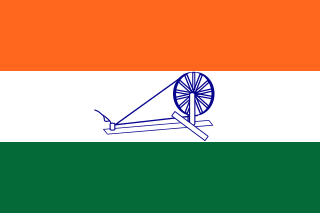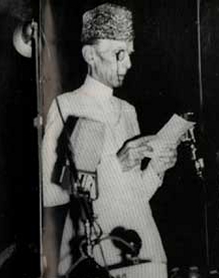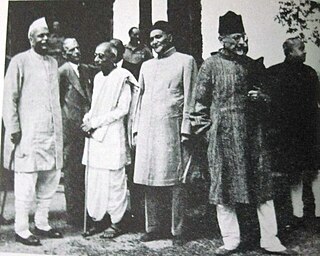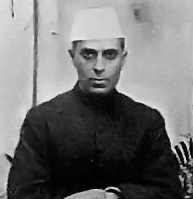Secular and Nationalist Jinnah is a book about Muhammed Ali Jinnah written by Ajeet Javed of JNU Delhi, India.

As a physical object, a book is a stack of usually rectangular pages oriented with one edge tied, sewn, or otherwise fixed together and then bound to the flexible spine of a protective cover of heavier, relatively inflexible material. The technical term for this physical arrangement is codex. In the history of hand-held physical supports for extended written compositions or records, the codex replaces its immediate predecessor, the scroll. A single sheet in a codex is a leaf, and each side of a leaf is a page.

India, also known as the Republic of India, is a country in South Asia. It is the seventh largest country by area and with more than 1.3 billion people, it is the second most populous country and the most populous democracy in the world. Bounded by the Indian Ocean on the south, the Arabian Sea on the southwest, and the Bay of Bengal on the southeast, it shares land borders with Pakistan to the west; China, Nepal, and Bhutan to the northeast; and Bangladesh and Myanmar to the east. In the Indian Ocean, India is in the vicinity of Sri Lanka and the Maldives, while its Andaman and Nicobar Islands share a maritime border with Thailand and Indonesia.
An interesting book which appreciates the 'greatness' of Jinnah while claiming that Pakistan was his fall-back position when he failed to convince Congress hardliners about a greater share for Muslims in the Post-British power structure.
Highlights
- Jinnah started taking part in politics from the Indian National Congress platform after returning from London in 1904. He delivered his first political speech in 1906 at the Calcutta meeting of the Indian National Congress.
- Jinnah supported the moderates against hardliners when Congress faced internal split in the Surat meeting in 1907.
- Jinnah considered politics as a gentleman's passion: he refused to attend and even condemned the Bombay Bar Association meeting held to celebrate the award of Knighthood to Justice Davar because he had joined the Government in convicting a nationalist leader Bal Gangadhar Tilak earlier.
- Jinnah firmly believed in constitutional struggle for the freedom of India but he refused to condemn Bhagat Singh. Singh was a socialist and nationalist who had thrown a bomb without life-threatening parts in the parliament (when Jinnah was present) and later given himself up to police so that he could use the courtroom as a propaganda office. Later, Jinnah was the loudest voice [1] in the parliament for understanding the route to freedom which Mr. Singh had chosen.
- Jinnah was offered several high-profile jobs during his political career to compromise his integrity but he refused them with contempt. These offers included opportunities to become a Judge in the Bombay High Court, a member of the Central Legislative Council, Knighthood ("I prefer to be called Mr. Jinnah"), and Governorship of Bombay etc.
- The book refers to Muhammad Ali Jinnah's 11th August Speech as evidence of his commitment to secularism even after championing a Muslim cause and winning a separate country on its basis.

The Indian National Congress(
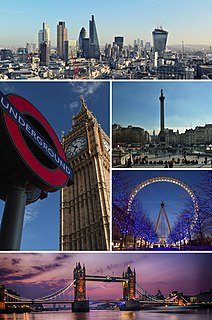
London is the capital and largest city of both England and the United Kingdom. Standing on the River Thames in the south-east of England, at the head of its 50-mile (80 km) estuary leading to the North Sea, London has been a major settlement for two millennia. Londinium was founded by the Romans. The City of London, London's ancient core − an area of just 1.12 square miles (2.9 km2) and colloquially known as the Square Mile − retains boundaries that follow closely its medieval limits. The City of Westminster is also an Inner London borough holding city status. Greater London is governed by the Mayor of London and the London Assembly.
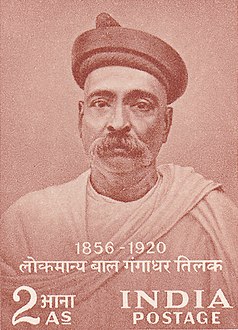
Bal Gangadhar Tilak, born as Keshav Gangadhar Tilak, was an Indian nationalist, teacher, lawyer and an independence activist. He was the first leader of the Indian Independence Movement. The British colonial authorities called him "The father of the Indian unrest." He was also conferred with the title of "Lokmanya", which means "accepted by the people ".









